Does your heart sense your emotional state?
"An appreciative heart is good medicine"
Once upon a time, psychologists claimed that emotions were solely mental manifestations produced by the brain. The truth is that emotions have just as much to do with the heart and body as they do with the brain, as we now know. The heart is one of the body's organs that has a particularly significant impact on our emotional experience. The interaction of the brain, heart, and body causes an emotion to be felt.
Emotions and the heart
Our emotions alter the signals
that the brain sends to the heart, and the heart responds in intricate ways.
The heart and the brain are constantly communicating with one another. But as
we now understand, the heart communicates with the brain more frequently than
the brain communicates with the heart. Additionally, the brain reacts to the
heart in numerous significant ways. This study shows how the heart reacts to
emotional and mental reactions as well as why some emotions cause the body to
become stressed and sap our vitality. Our heart rate patterns become more
unpredictable as we feel emotions like rage, irritation, worry, and insecurity.
The brain's emotional centres receive these irregular patterns and interpret
them as unpleasant or stressful feelings. The actual feelings we feel in our
bodies and in the space around our hearts are produced by these messages.
Additionally, the irregular heartbeats prevent us from thinking effectively.
Benefits come from being
appreciative
One of the most tangible
and simple pleasant emotions for people to self-generate and maintain for
longer periods of time is the sensation of thankfulness. Almost everyone can
discover something they actually enjoy. The coherence of your heart beat can be
increased, emotional stress can be decreased, and your health can be improved
by just remembering a time when you felt real appreciation and recreating that
sensation.




Comments
Post a Comment